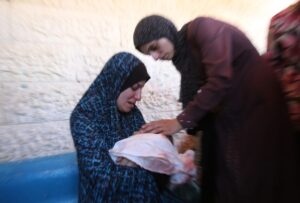What it’s like for Palestinian women living through the Gaza genocide

Palestinian women mourn over an infant killed in an Israeli air strike on her home north of Nuseirat, in the central Gaza strip, 19 July 2024
Yasmin Abusayma reports in Mondoweiss on 24 July 2024:
While the world often focuses on the political and military aspects of Gaza, the daily realities encountered by women are frequently overlooked. Women in Gaza bear heavy burdens, demonstrating remarkable resilience while navigating the harsh realities of Israel’s genocidal war.
In April, UN Women released its latest Gender Alert on Gaza, highlighting the profound impact of the ongoing war. Six months into the war, at least 10,000 Palestinian women in Gaza had lost their lives, including approximately 6,000 mothers, resulting in 19,000 children left without parents. Surviving women face displacement, widowhood, and severe food shortages due to Israeli airstrikes and ground operations. This catastrophic impact underscores the war’s disproportionate toll on Gaza’s women. As the war continues to reshape traditional gender roles, the strength and perseverance of these women will undoubtedly have long-lasting effects on Gaza’s social dynamics and gender equality.
The stories of Lina Alshanti, Salwa Mohammed, Hala, and Nedaa’ Alhemdiat highlight the incredible resilience and adaptability of women in Gaza during the war. Forced to take on new roles and responsibilities, these women contribute significantly to their families and communities despite facing immense hardships.
Lina
Lina Alshanti, a 33-year-old English teacher, represents the extreme adaptations women in Gaza must endure. Living in an overcrowded apartment in Khan Younis with her extended family, including her husband and two young daughters, Lina faces a constant struggle for privacy. “I had to wear a hijab 24/7 because the rooms were filled with men, and we had to share the same toilet,” Lina explains. “I almost forgot how it felt to be a girl. I missed seeing my hair and taking a normal shower with clean hot water.” When her family moved to another small, dilapidated apartment in Rafah, Lina’s struggle continued. “Even in this house, I had to wear a hijab all day because the situation was dangerous. I was afraid of being killed at any moment, and most of the windows were not covered and in poor condition,” she recalls. This constant need for coverage, particularly in the sweltering heat, severely impacts their personal comfort and well-being.
